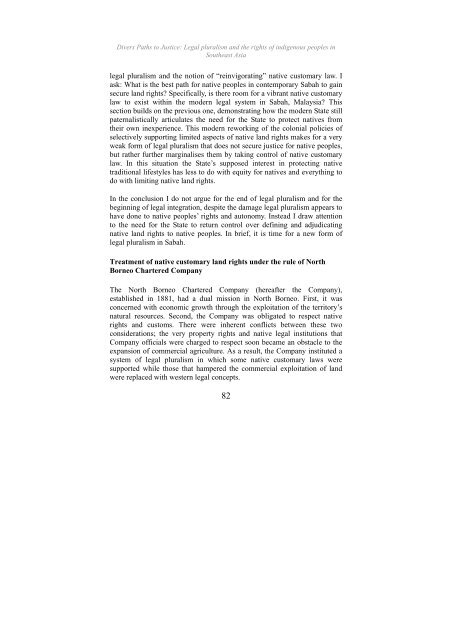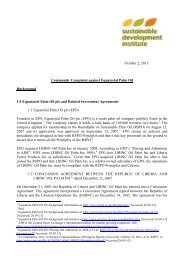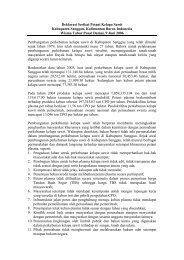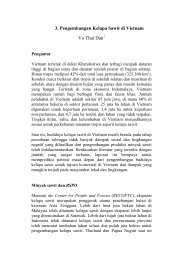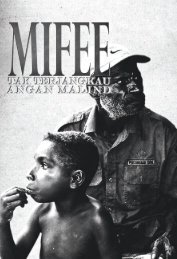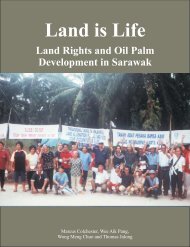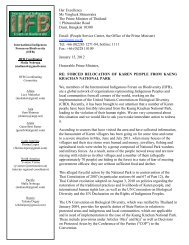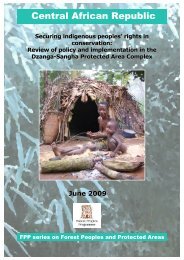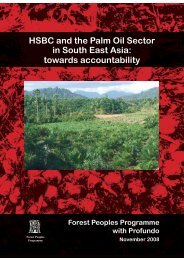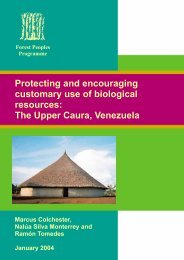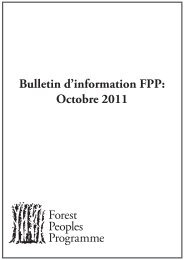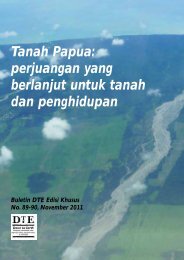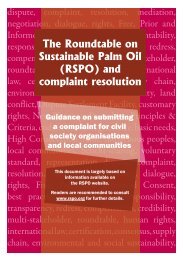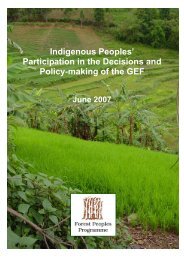Divers Paths to Justice - English - Forest Peoples Programme
Divers Paths to Justice - English - Forest Peoples Programme
Divers Paths to Justice - English - Forest Peoples Programme
You also want an ePaper? Increase the reach of your titles
YUMPU automatically turns print PDFs into web optimized ePapers that Google loves.
<strong>Divers</strong> <strong>Paths</strong> <strong>to</strong> <strong>Justice</strong>: Legal pluralism and the rights of indigenous peoples inSoutheast Asialegal pluralism and the notion of “reinvigorating” native cus<strong>to</strong>mary law. Iask: What is the best path for native peoples in contemporary Sabah <strong>to</strong> gainsecure land rights? Specifically, is there room for a vibrant native cus<strong>to</strong>marylaw <strong>to</strong> exist within the modern legal system in Sabah, Malaysia? Thissection builds on the previous one, demonstrating how the modern State stillpaternalistically articulates the need for the State <strong>to</strong> protect natives fromtheir own inexperience. This modern reworking of the colonial policies ofselectively supporting limited aspects of native land rights makes for a veryweak form of legal pluralism that does not secure justice for native peoples,but rather further marginalises them by taking control of native cus<strong>to</strong>marylaw. In this situation the State’s supposed interest in protecting nativetraditional lifestyles has less <strong>to</strong> do with equity for natives and everything <strong>to</strong>do with limiting native land rights.In the conclusion I do not argue for the end of legal pluralism and for thebeginning of legal integration, despite the damage legal pluralism appears <strong>to</strong>have done <strong>to</strong> native peoples’ rights and au<strong>to</strong>nomy. Instead I draw attention<strong>to</strong> the need for the State <strong>to</strong> return control over defining and adjudicatingnative land rights <strong>to</strong> native peoples. In brief, it is time for a new form oflegal pluralism in Sabah.Treatment of native cus<strong>to</strong>mary land rights under the rule of NorthBorneo Chartered CompanyThe North Borneo Chartered Company (hereafter the Company),established in 1881, had a dual mission in North Borneo. First, it wasconcerned with economic growth through the exploitation of the terri<strong>to</strong>ry’snatural resources. Second, the Company was obligated <strong>to</strong> respect nativerights and cus<strong>to</strong>ms. There were inherent conflicts between these twoconsiderations; the very property rights and native legal institutions thatCompany officials were charged <strong>to</strong> respect soon became an obstacle <strong>to</strong> theexpansion of commercial agriculture. As a result, the Company instituted asystem of legal pluralism in which some native cus<strong>to</strong>mary laws weresupported while those that hampered the commercial exploitation of landwere replaced with western legal concepts.82


